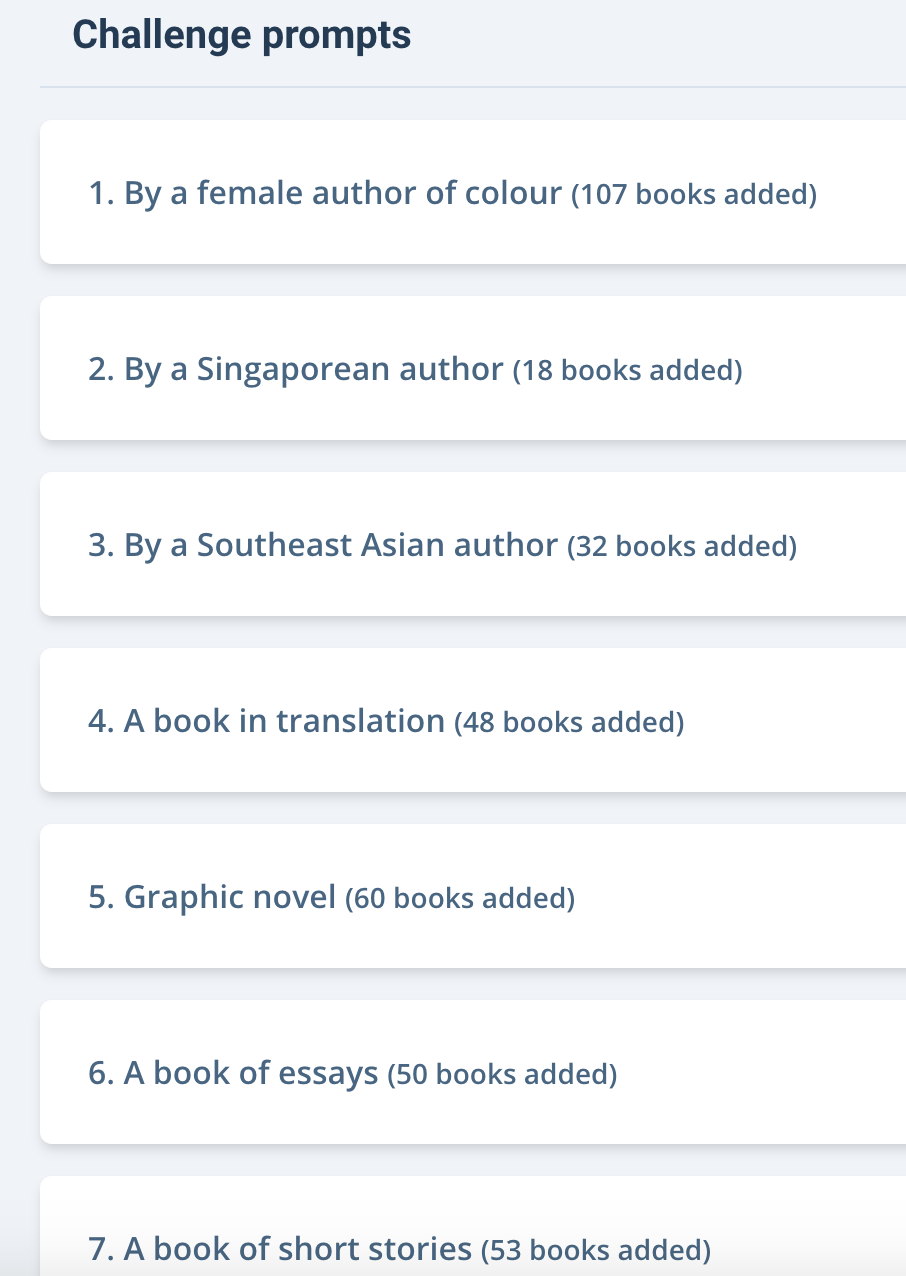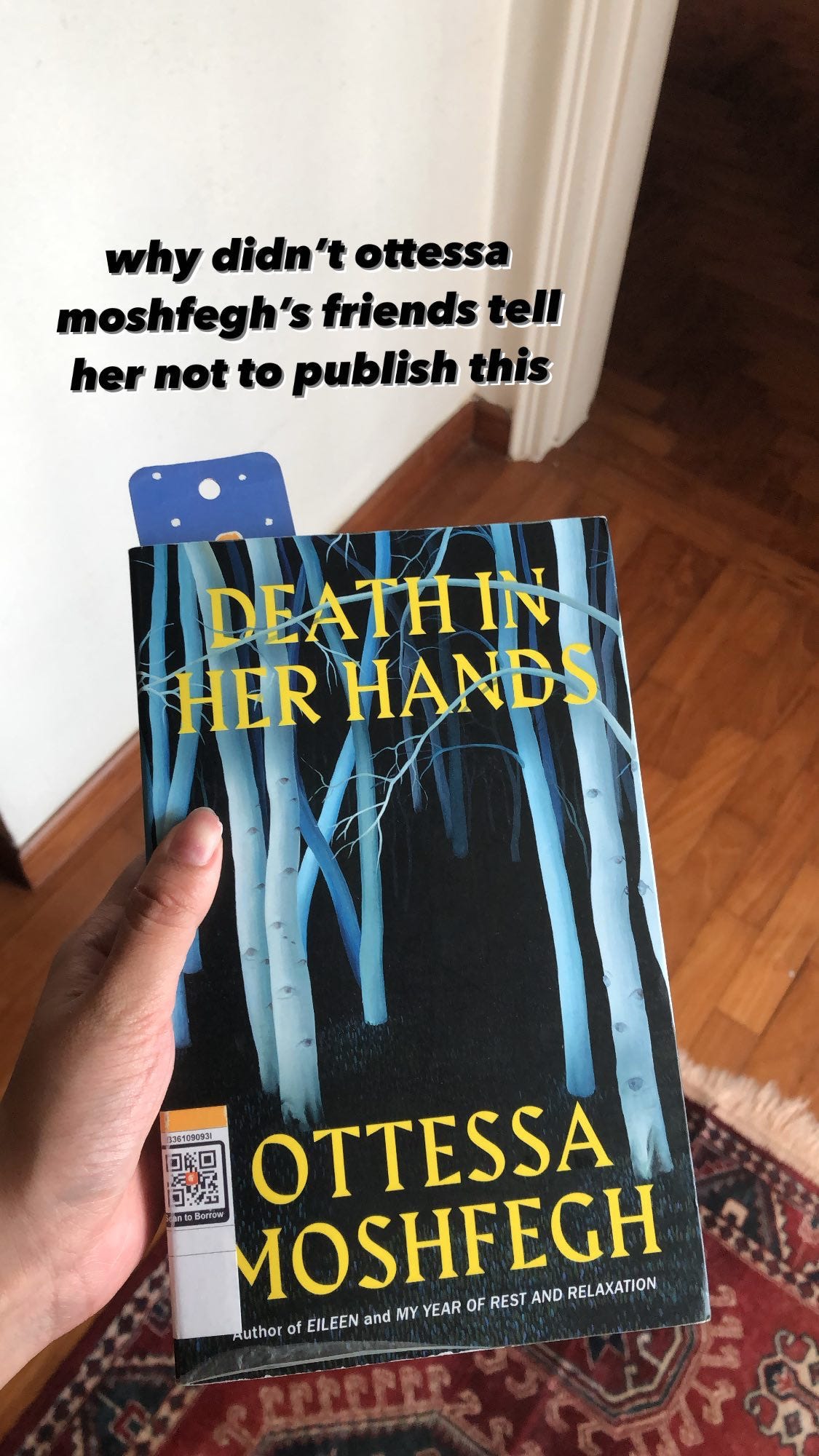Reading for Quitters
Now that February is coming to an end, you’ve probably decided if you’re a “reading goal” person or not. When I worked at the bookstore, I put together a “reading challenge” with 25 prompts for 2020. I included prompts like “read a book from a Southeast Asian author” and “read a collection of essays” to help nudge people into diversifying their reading palate. I didn’t complete the challenge because I couldn’t balance the reading requirements of my job with the prompts but it was great to hear from people who had! I added it to the app StoryGraph (it’s like Goodreads but better) and got to see all of the titles people read to fulfil the challenge.
I read often but I don’t read a lot of full books. 2020 was my first year out of university and the first time in a long time that I wasn’t saddled with required reading. Reading was fun again. I proceeded at my own pace – reading only half a book during lockdown because my brain felt like oatmeal – and completed 53 titles last year. At the same time, I know people who set themselves more ambitious targets. One of my colleagues aimed for 200 titles a year!! Apps like Goodreads and The StoryGraph are useful tools and databases if you enjoy tracking your books and discovering new titles. I do think that they contribute to a larger trend in tech of gamifying everything and, in the case of Goodreads especially, turning everything into content.
I can definitely see the merit in targets. Some people are really goal-oriented and meeting targets makes them feel accomplished. Pop-psychologists call them Type A? Not I! I am purely vibes-oriented. If the vibe is not right, I quit.
More power to you if you’re a person who loves goals. I set myself a loose target this year as an incentive; reading always makes me feel better but I need the occasional kick in the butt to do nice things for myself. However, I don’t like being beholden to the number. I think it trains your focus on completing books above anything else, including enjoyment! I am here today to make the case against finishing books. 😈

Two things:
Reading 5 books at once is very cool and normal. (I am reading 4 books right now.)
Always, always quit books if they aren’t doing anything for you! Never feel bad. I absolve you of all guilt now.
As a cautionary tale, let me tell you what happened when I pushed on with a book I hated. What did I get in return? Absolutely nothing. It did not get better. It got worse. I got upset. I posted about it on Instagram. A lot of people responded. Actually, reading a bad book got me lots of engagement. Now, if I was a careerist I would capitalise on this but I’m not. And remember, I hate bad vibes.
A brief detour to tell you why Death In Her Hands is a bad book
Death In Her Hands is described as “a triumphant blend of horror, suspense, and pitch-black comedy”. The reader follows Vesta, an old woman who comes across a cryptic note on her daily walk.
Her name was Magda. Nobody will ever know who killed her. It wasn’t me. Here is her dead body.
Curiosity piqued, Vesta sets out to solve Magda’s mystery and hunt down the killer.
I was looking forward to seeing how Moshfegh’s misanthropic humour would come through in a mystery novel. I loved her previous book, My Year of Rest and Relaxation. I felt totally seen here: in a book where the protagonist drugs herself into hibernation because she’s had enough of life. I did that once for 3 days before running out of prescription drugs. Fiction can be so aspirational. Representation matters!!!
Mystery stories technically have plot propulsion built in: they open with an essential question and readers follow along as the protagonist finds clues, stitches them together, and solves the problem. There are various grades of mysteries, of course, but it tends to be a foolproof formula for hooking an audience. That’s how they were able to make so many CSI spin-offs. Death In Her Hands has absolutely no hook. A lot of the book takes place in Vesta’s imagination. She forms theories about the person who left the note, Magda and her life, and invents a list of suspects, alibis, and motives. The note is the only clue she discovers. Every other aspect of the mystery is pure fabrication.
My gripe with the book isn’t that it failed to adhere to the conventions of a mystery novel. Moshfegh clearly wasn’t interested in writing a classic mystery. Instead, she uses the plot as a vehicle for exploring the degradation of an unreliable narrator’s mind. Vesta seizes upon insignificant details and uses them as fodder for her clearly untenable version of what happened to Magda. As the book progresses, the reader is meant to question how much of Vesta’s narration is true versus invented. However, because Vesta is a hermit with a dog in a small town, we rarely get to see any contrast between her and other (saner) characters, which would have helped the success of this characterisation. Furthermore, as the events of the book take place in her head, everything is read in a hypothetical tense. It was frustrating to follow Vesta’s dull and fruitless threads for pages and pages, only to reach the end and realise she’s still sitting in a computer chair at the public library. The frustration set in fairly early. I was already bored by page 30 but I pushed through, hoping that I’d find some pay off. Reader, there was none. If anything, reading the hurried and unnecessary ending vexed me more than leaving the story unresolved.
If the premise of Death In Her Hands intrigued you, please read Nobel Prize winner Olga Tokarczuk’s Drive Your Plow Over the Bones of the Dead. It features an eccentric dog-loving old lady trying to solve a murder mystery in a small Polish village. There are so many similarities between the two books (down to mentions of William Blake’s poetry) that it’s hard to believe Moshfegh didn’t reference Tokarczuk. In any case, Drive Your Plow is a brilliant example of what a subversive take on the mystery genre can look like. Definitely worth finishing.
Back to our regular programming
I pushed on with Death In Our Hands because I was convinced that Moshfegh was going somewhere with that book and I needed to see what she was trying to do. I spent two whole weeks wrestling with a <300 page book when I could have read 12 Nancy Drew novels instead!
More than other forms of media, books get put on a pedestal of intellectualism. They’re for smart people, they make you a more virtuous and considered person, reading them is a righteous act bla bla bla. I don’t buy any of it. I clearly enjoy books. But I enjoy them on my terms. I abandon books all the time. Rachel Cusk’s Outline wasn’t doing anything for me so I stopped reading it with only 20% of the book left to go. I don’t regret it. I also regularly leave books I enjoy unfinished. Sometimes it just doesn’t feel like the right time to read on. I still have two-thirds of A Manual For Cleaning Women to go. It feels precious to me because it was a parting gift from my friend Gwen when I moved back to Singapore. I don’t want to finish it, I want to savour it. And each pearl of a story in that collection invites a slow reading.
There’s no right way to read. You don’t have to read a certain number of books a year or be familiar with canonical authors or read widely if you don’t want to. Life is already such a slog. Don’t turn your hobbies into chores!
What I’m Reading
In the spirit of not finishing books, I am currently reading two gigantic books simultaneously. I’m still going with Ducks, Newburyport (1,030 pages) and I recently started The Visiting Privilege (512 pages). I’m reading The Visiting Privilege as an eBook on my Kobo but I’m probably going to buy the book soon. It’s a terrific book and I don’t want to finish it within the duration of a library loan. Some of the short stories in it leave me feeling cold and gummy. It’s not a book to tear through.
Do you abandon books? Do you think you will now? Have I freed you from the mental prison of completionism? Let me know in the comments! Or email me if you like the privacy 😊 I always respond. I am genuinely curious to know what you’re reading. If you’re curious, the book Bade abandoned was The Thursday Murder Club by Richard Osman. I guess he’s a writer now but he’s also the host of one of TV’s most soporific trivia shows. Goodnight!





